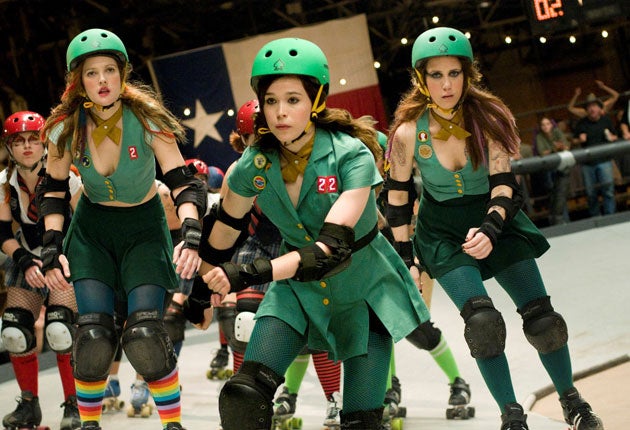Roller Derby: Getting women back into sport
The sporting gender gap between the sexes is widening. But one activity is bucking the trend

It's fast, feisty and feminist – and is bucking a dispiriting trend that has seen the number of women taking part in sport slump in recent months. Welcome to the world of roller derby, one of the UK's hottest new sports and the ultimate star of Whip It, a new Drew Barrymore film that opens across Britain this week. The sport's increased profile is tipped to cement its growing popularity, which has seen the number of roller derby clubs at least double in the past year to 35, with more being formed each week.
More than 500 women – and a handful of men – roll up each week to play the contact sport that started life as a simple skating race in the US during the Great Depression. Matt Price, a referee who tracks the game's development for UK Derby News, said women like roller derby, first played four years ago in Britain, because it is a very "accepting sport".
"It's popular because there's no requirement to be a traditional athlete. Size and age don't matter. Some of the most massive girls are the best players. Or you can be 5ft and really skinny and still good, because there are lots of different roles on the team. There's no prejudice," he said.
Laura Omand, who skates for the Leeds Roller Dolls, said: "It's a good way to be part of a team without being under a huge pressure to be the best straight away. Everyone is supportive and enthusiastic and everyone who plays is very addicted."
Growing interest in roller derby, which this month sees London Brawling take on three US teams on an American tour, comes at a crucial time for women's sport. New research by Sport England shows the number of womenparticipating in sport at least three times a week dropped by 24,000 in the 12 months to January to 2.76 million. That contrasted with a 20 per cent surge in the number of men doing sport, which increased to 4.24 million.
The decline is forcing a number of male-dominated sports such as boxing and judo to overhaul their approach to encourage more women to take them up.
But campaigners warn that until events such as yesterday's Oxford and Cambridge Boat Race, televised worldwide, include the women's race (held a week before at Henley, which Oxford won) as well as the men's, then women will continue to shun sports in favour of other pursuits.
Sue Tibballs, chief executive of the Women's Sport & Fitness Foundation, which campaigns to drive up female participation, said women were struggling to make time for regular training sessions, with team sports suffering in particular.
"Women are busier, juggling kids and work. We are also more ambitious in how we use our time. Sport is competing with everything else we do, like book clubs and shopping," she said. She urged the media to help by championing women's sports instead of sidelining them. Experts warn that gender bias in competitive sports is an age-old problem, with many still dominated by men in blazers. To compound the problem, many women struggle with a negative body image and traumatic memories of school PE lessons, which stop them from either wanting to continue an old sport or take up a new one.
Lisa O'Keefe, director of sport at Sport England, said it was important to invest in ways that overcome the particular barriers to women taking part in sport. That means more help with childcare costs, as well as making sport "more fun and accessible to women across the country".
Subscribe to Independent Premium to bookmark this article
Want to bookmark your favourite articles and stories to read or reference later? Start your Independent Premium subscription today.

Join our commenting forum
Join thought-provoking conversations, follow other Independent readers and see their replies